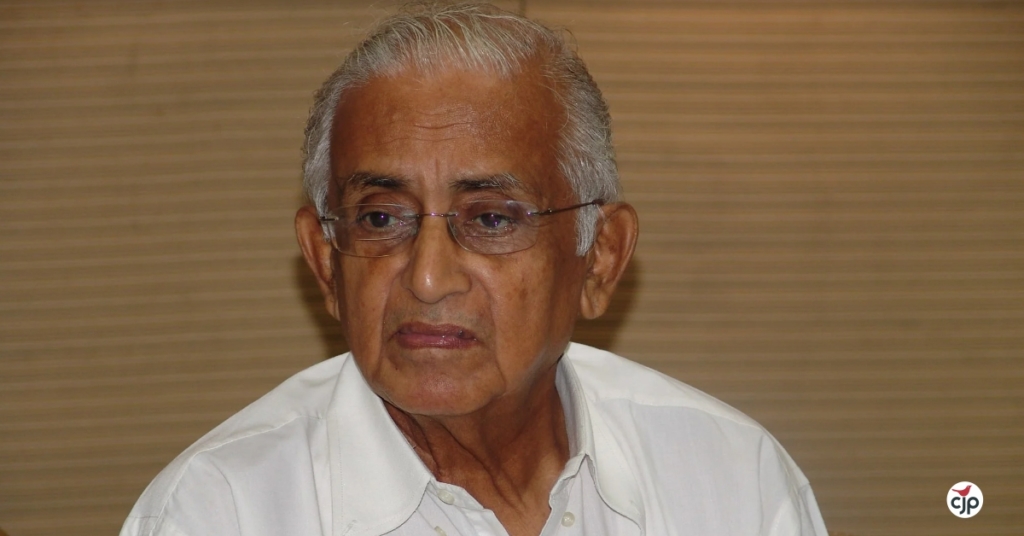
CJP proudly presents Justice Hosbet Suresh Archives A collection of his fact-finding reports and writings from his post-retirement human rights work
20, Jul 2020 | CJP Team
Justice Hosbet Suresh, legal luminary and a stalwart of human rights jurisprudence, continues to live on in not just our hearts, but also his work, particularly that from his post-retirement years. He provided a voice to the voiceless through a series of fact-finding missions, people’s tribunals and public hearings, enabling even the oppressed and exploited to have access to justice.
On his birthday, July 20, Citizens for Justice and Peace (CJP) is launching an archive of his reports of all these tribunals and public hearings. These include report on an inquiry into the December 1992-January 1993 Mumbai Riots, the July 1997 police firing at Ramabai Nagar, an inquiry into the Gujarat genocide of 2002 and much more.
Explaining the motivation to collate and host this archive, CJP secretary and human rights defender Teesta Setalvad said, “There could be no greater lasting tribute to the man than ensuring an enduring and pro-active archiving of the rights jurisprudence that he pioneered with Justice Krishna Iyer as his mentor and hundreds of human rights defenders as his allies. For him justice meant justice for the most far flung and deprived sections making the values of the right to life with dignity a living and lasting principle. From the right to access public education, to dignity of a living wage, to the livelihoods of margnalised coastal communities, against torture, state targeted violence against India’s religious minorities, it was Justice Hosbet Suresh who led the way. At a time when we are being badgered by state and non state actors alike, we in the Indian human rights movement need to re-dedicate ourselves to the fight that Justice Hosbet Suresh gave so many valued years to. It is also the fight to the finish as India slides into the miasma of a majoritarian autocracy.”
CJP has received words of encouragement from many human rights defenders for this initiative. Activist Irom Sharmila, often hailed as the Iron Lady of India, credited him with opening her eyes to injustice saying, “I came to witness the real goings-on in human rights violations due to the Armed Forces Special Powers Act (AFSPA) in my own native state of Manipur, only after I participated in the internship based on the people’s fact-finding judiciary commission headed by Justice Hosbet Suresh.”
Women’s rights activist Flavia Agnes of Majlis said, “If all the reports he had authored could be collected, they will form a veritable archive for future generations, to study the extent of human rights violations that had taken place during the last three decades.” She added, “The online archive will provide easy access to those who are engaged with the subject of human rights either at an academic level or as an activist on the ground. More importantly, Justice Suresh’s life and work will act as a beacon of hope for future generations, who might have to work in situations even more challenging than what we are witnessing today.”
Senior advocate Mihir Desai said, “It is indeed highly laudable that Citizens for Justice and Peace is creating an archive of post retirement documents of Justice Suresh. That it is being launched on his birthday is doubly gratifying.” Expressing his admiration for the late Justice Suresh, Adv Desai said, “Justice Suresh, especially post retirement, was known as the man of the masses. Throwing himself into the deep end whenever and wherever there were human rights violations, doggedly participating in fact findings, people’s tribunals, and enthusiastically travelling to distant places including Kashmir, Manipur, Tamil Nadu to name just a few. He insisted on meeting victims of violations directly and interacting with them with compassion and empathy.”
Shedding light on how Justice Suresh helped reshape the underlying principles of human rights, Sanjeewani Jain of Lok Raj Sangathan said, “Justice Suresh was an upholder of the Right to Life, which he insisted, was the Right to a Life of Dignity with access to everything that is necessary in this day and age, like sanitation, education, health services, electricity, etc. apart from food, clothing and shelter. This was a creative and vital interpretation of the Right to Life as defined in the Indian Constitution.”
We are grateful to Justice Hosbet Suresh’s family for their support in this endeavour. His daughters; Rajini Sondur, Shalini Prasad and Malini Kanal penned a few words exclusively for us, “It didn’t matter to him that he’d have to go deep into the country, in whatever transport was available. It didn’t matter to him what facilities would be available. Regardless of his age. He took it all in his stride, with a shrug and a smile.” They added, “We were the privileged ones, for we grew up imbibing these ideals. With this website, we hope his work inspires many to follow in his footsteps!”
Words of encouragement and testimonials are still pouring in with human rights defenders and legal stalwarts writing to us. These include senior advocate Gayatri Singh, activist John Dayal, the Coastal Action Network, the CIEDS Collective and many more.
Today is just the beginning. We will continue to add more resources in the coming months and will also make content available in regional languages over time. We hope this archive enables CJP and all people passionate about human rights to not just walk in Justice Hosbet Suresh’s footsteps but to further develop the jurisprudence that he so eloquently pioneered.
The entire archive may be viewed at: Justice Hosbet Suresh Archives










